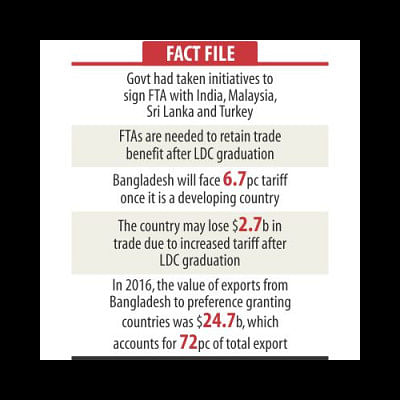FTAs far away

The signing of the much needed free trade agreements (FTAs) with the important trading partners is still far away for Bangladesh as many countries are not showing interest to go for such deals, despite the hectic efforts over the years.
The government is now looking for ways to sign preferential trade agreements with the trading partners.
The preferential agreements are vital for Bangladesh to remain competitive in the international market, Commerce Minister Tofail Ahmed told The Daily Star.
"These (preferential trade agreements) will also help Bangladesh to continue getting the duty benefits after its graduation from the league of least developed countries (LDCs)."
The government is also trying to sign an FTA with Sri Lanka, he said.
"We set September 31 as a deadline to ink an FTA with the Lankan government. But unfortunately, Sri Lanka is moving very slow.
Bangladesh's hope for gaining success in signing the FTA is fading by the day, "but the process is still going on", Ahmed said.
The minister also blamed the delay on the unstable political situation in the island nation.
Bilateral FTAs have been becoming instrumental in the global trading system as the prospects of multilateral trading systems under the World Trade Organization are decaying gradually. There are more than 200 such deals worldwide.
Even neighbouring India has already signed an FTA with the Association of South East Asian Nations (Asean) and was trying to sign another with the EU.
"We are even interested to sign an FTA with Turkey. But they are also moving very slow because if there is an FTA between Turkey and Bangladesh, it comes in Bangladesh's favour."
"We have sent a proposal to Thailand also. We are studying and we are trying to have a bilateral trade agreement between the two countries," the minister said.
Signing of the FTAs with some countries is being delayed because every country looks after its own interests, Ahmed said.
For instance, Malaysia is interested to sign an FTA with Bangladesh, but "we are not interested".
If Malaysia gets duty-free market access through the process of FTA, it will go in its favour because the trade is already tilted towards the country governed by the Mahathir-led coalition, the minister said.
Bangladesh exports $300 million-worth goods to Malaysia while the import figure has hit $2 billion. "That is the reason for us to go slow."
"After holding meetings for years spending millions of US dollars Bangladesh backtracked from signing an FTA with Malaysia at the final moment a few years ago," a commerce ministry official said requesting anonymity.
Bangladesh will have to be ready and continue lobbying with the major trading partners for the FTAs as the erosion of preference will affect the trade significantly after the graduation, said Mustafizur Rahman, distinguished fellow at the Centre for Policy Dialogue, a private think-tank.
"The country should not only try to sign FTAs, but also lobby with major countries and trade blocs for signing the Comprehensive Economic Partnership Agreement which include trade, tourism and investment," Rahman said citing the example of India and Asean FTA.
Regarding the delay of FTA signing with Sri Lanka, Rahman said a powerful anti-FTA lobby has been opposing the signing of such trade deal by Sri Lanka.
"But, Bangladesh should continue lobbying Sri Lanka for signing the agreement," he said. Bangladesh needs strong research on trade and FTA issues, he said.
Meanwhile, Bangladesh's exports will face an additional 6.7 percent tariff, which could result in an estimated export loss of about $2.7 billion in a year, Mia Seppo, United Nations resident coordinator in Bangladesh, said in a recent meeting in Dhaka.
The amount of loss is equivalent to 8 percent of Bangladesh's export receipts in 2015, Seppo said.
The United Nations Conference on Trade and Development estimated that exports may fall by 5.5 percent to 7.5 percent after the graduation.
In 2016, the value of exports from Bangladesh to preference granting countries was $24.7 billion, which accounted for 72 percent of the total exports.
Regional trade agreements and bilateral initiatives cover about 90 percent of the exports, she said.
For example, Bangladesh is the highest user of the EU's generalised system of preferences (GSP) under the Everything but Arms scheme among the 48 LDCs. Bangladesh alone used 67 percent of the trade preference, according to EU.
Currently, Bangladesh enjoys zero-duty benefit on export to 38 countries, including 28 EU nations.
Apart from the GSP facility, the country has also been enjoying concessional duty preference in different countries under Rules of Origin criteria, or under different regional agreements like SAFTA (South Asian Free Trade Agreement), APTA (Asia Pacific Trade Agreement) and WTO's arrangement of 97 tariff line in the developing countries.

 For all latest news, follow The Daily Star's Google News channel.
For all latest news, follow The Daily Star's Google News channel. 



Comments